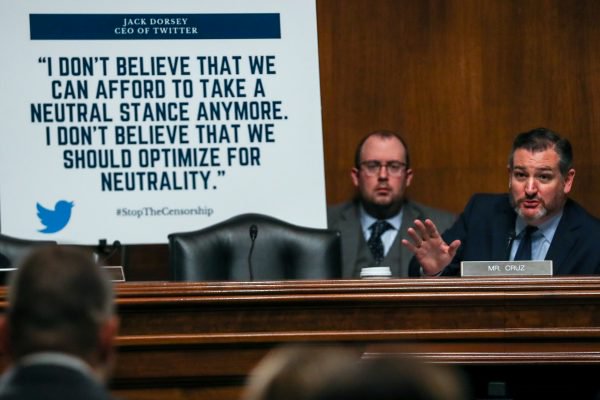The recent Republican embrace of trade protectionism is pretty weird. Plenty of economic and historical evidence shows tariffs to be harmful, self-defeating policy. They certainly never made America great. Then there’s how the same supply-side ideology that intellectually powers GOP tax policy also blames the Smoot-Hawley Tariff Act of 1930 — a pretty big tax, by the way — for the Crash of 1929 and subsequent Great Depression. (As President Reagan once put it, “We should beware of the demagogues who are ready to declare a trade war against our friends — weakening our economy, our national security, and the entire free world — all while cynically waving the American flag.”) Like I said, pretty weird.
Senator Ted Cruz (R-TX) questions Facebook policy director Neil Potts before a Senate Judiciary Constitution Subcommittee hearing titled “Stifling Free Speech: Technological Censorship and the Public Discourse.” on Capitol Hill in Washington, US, April 10, 2019. REUTERS/Jeenah Moon
Yet, if not for the Great Protectionist Reversal, the escalating Republican offensive against Big Tech would take the top spot for policy peculiarity. First, the attacks betray an embrace of tech optimism that’s been a big part of the modern GOP. “We’re breaking through the material conditions of existence to a world where man creates his own destiny,” Reagan told the students at Moscow State University back in 1988. American technology companies continue to do their part in pushing forward the technological frontier. Europe would love to have them, and China is working hard to duplicate them. Yet some in Washington think America would be better off without them.
Second, the attacks are too often factually inaccurate or fact free. One example: Some Republicans want to radically change the law that protects all internet companies from the actions of their users and allows them to moderate content (indeed, the law was intended to encourage them to do just that.) Yet over and over again, they misstate what the law requires and the legislative intent behind it. Another line of criticism is that social media is bad for kids. But authors of a landmark study argue that “social media use has only minor effects on wellbeing.”
Third, the attacks are a bit cranky, at least when they come to the charge that Big Tech is suppressing conservative thought. In fact, social media has been great at amplifying right-wing voices. The Washington Posts points out the following: “After right-wing influencers and online provocateurs flocked to the White House earlier this month for a summit on how they’d been suppressed across social media, a remarkable thing happened: Their social media audiences soared.” And conservative Boston Globe rightly notes that some of the biggest complainers about social media censorship owe their big platforms to… social media.
Some issues have staying power, while others fade. I’m afraid these new takes on tech and trade will linger for some time.


















